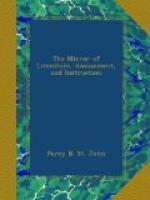Stone pillars, or crosses were also raised to record remarkable events; as where a battle had been fought, or over persons of distinction slain therein. Crosses were likewise erected where any particular instance of mercy had been shown by the Almighty, or where any person had been murdered by robbers, or had met with a violent death; where the corpse of any great person had rested on its way to interment, as those splendid ones erected by Edward I. in memory of his beloved Queen Elinor; often in churchyards, and in early times at most places of public concourse; in market-places, perhaps to repress all idea of undue gain or extortion; and at the meeting of four roads.
Penances were often finished at crosses. Near Stafford stood one called Weeping Cross, from its being a place designated for the expiation of penances, which concluded with weeping and other signs of contrition. A great number of sepulchral crosses were erected in Great Britain and Ireland, soon after prayers for the dead came into use, by the desire of individuals, at their places of interment, to remind pious people to pray for their souls.
The ancient practice of consecrating Pagan antiquities to religious purposes, has been continued to times comparatively modern; thus, Pope Sixtus V. purified the Antonine column and that of Trajan, dedicating them to St. Peter and St. Paul, whose statues, of a colossal size, he placed on their summits. Succeeding Popes followed these examples, dedicating ancient columns, pillars, and obelisks to different Saints and Apostles.
A CORRESPONDENT.
* * * * *
NOTES OF A READER.
* * * * *
THE LONDON UNIVERSITY MAGAZINE,
No. 1.
It is seldom that we “turn critics;” but our very bile rises at the ill-timed dedication of this work to the King, as the “first fruits of the combined exertions of a few of your majesty’s subjects, educated within the GROSSLY misrepresented UNIVERSITY of LONDON.” It is quite unnecessary for us to explain why this Dedication deserves the epithet we have chosen: it stands with the signature of “the Proprietors,” and we hope is not the act of the editors; but for the credit of the University, the publishers, the proprietors, and editors, we recommend their friends to cancel the leaf bearing this very offensive inscription, whether they care or not for the golden opinions of all sorts of people.
If the present Number be a fair sample of the London University Magazine, we can promise the reader but little amusement in our “Notes” from its pages. It may prove useful enough to the students of the University, but it wofully lacks the attractive features of a Magazine for the public; it may suit the library-table, but not the “excellent coffee room,” or the “retired cigar room” of the University Hotel. “On a general




